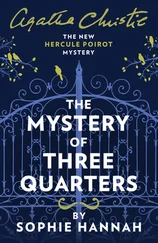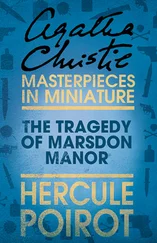Agatha Christie - Three Act Tragedy
Здесь есть возможность читать онлайн «Agatha Christie - Three Act Tragedy» весь текст электронной книги совершенно бесплатно (целиком полную версию без сокращений). В некоторых случаях можно слушать аудио, скачать через торрент в формате fb2 и присутствует краткое содержание. Жанр: Классический детектив, на английском языке. Описание произведения, (предисловие) а так же отзывы посетителей доступны на портале библиотеки ЛибКат.
- Название:Three Act Tragedy
- Автор:
- Жанр:
- Год:неизвестен
- ISBN:нет данных
- Рейтинг книги:4.5 / 5. Голосов: 2
-
Избранное:Добавить в избранное
- Отзывы:
-
Ваша оценка:
- 100
- 1
- 2
- 3
- 4
- 5
Three Act Tragedy: краткое содержание, описание и аннотация
Предлагаем к чтению аннотацию, описание, краткое содержание или предисловие (зависит от того, что написал сам автор книги «Three Act Tragedy»). Если вы не нашли необходимую информацию о книге — напишите в комментариях, мы постараемся отыскать её.
Three Act Tragedy — читать онлайн бесплатно полную книгу (весь текст) целиком
Ниже представлен текст книги, разбитый по страницам. Система сохранения места последней прочитанной страницы, позволяет с удобством читать онлайн бесплатно книгу «Three Act Tragedy», без необходимости каждый раз заново искать на чём Вы остановились. Поставьте закладку, и сможете в любой момент перейти на страницу, на которой закончили чтение.
Интервал:
Закладка:
“Not the slightest. It seems the police were watching the house all night, and they never saw him go – but, there, that’s what the police are, human like anyone else, in spite of the airs they give themselves, coming into a gentleman’s house and nosing round.”
“I hear there’s some question of a secret passage,” Sir Charles said.
Mrs. Leckie sniffed.
“That’s what the police say.”
“Is there such a thing?”
“I’ve heard mention of it,” Mrs. Leckie agreed cautiously.
“Do you know where it starts from?”
“No, I don’t, sir. Secret passages are all very well, but they’re not things to be encouraged in the servants’ hall. It gives the girls ideas. They might think of slipping out that way. My girls go out by the back door and in by the back door, and then we know where we are.”
“Splendid, Mrs. Leckie. I think you’re very wise.”
Mrs. Leckie bridled in the sun of Sir Charles’s approval.
“I wonder,” he went on, “if we might just ask a few questions of the other servants?”
“Of course, sir; but they can’t tell you anything more than I can.”
“Oh, I know. I didn’t mean so much about Ellis as about Sir Bartholomew himself – his manner that night, and so on. You see, he was a friend of mine.”
“I know, sir. I quite understand. There’s Beatrice, and there’s Alice. She waited at table, of course.”
“Yes, I’d like to see Alice.”
Mrs. Leckie, however, had a belief in seniority. Beatrice Church, the upper-housemaid, was the first to appear.
She was a tall thin woman, with a pinched mouth, who looked aggressively respectable.
After a few unimportant questions, Sir Charles led the talk to the behaviour of the house party on the fatal evening. Had they all been terribly upset? What had they said or done?
A little animation entered into Beatrice’s manner. She had the usual ghoulish relish for tragedy.
“Miss Sutcliffe, she quite broke down. A very warm-hearted lady, she’s stayed here before. I suggested bringing her a little drop of brandy, or a nice cup of tea, but she wouldn’t hear of it. She took some aspirin, though. Said she was sure she couldn’t sleep. But she was sleeping like a little child the next morning when I bought her her early tea.”
“And Mrs. Dacres?”
“I don’t think anything would upset that lady much.”
From Beatrice’s tone, she had not liked Cynthia Dacres.
“Just anxious to get away, she was. Said her business would suffer. She’s a big dressmaker in London, so Mr. Ellis told us.”
A big dressmaker, to Beatrice, meant “trade,” and trade she looked down upon.
“And her husband?”
Beatrice sniffed.
“Steadied his nerves with brandy, he did. Or unsteadied them, some would say.”
“What about Lady Mary Lytton Gore?”
“A very nice lady,” said Beatrice, her tone softening. “My great aunt was in service with her father at the Castle. A pretty young girl she was, so I’ve always heard. Poor she may be, but you can see she’s someone – and so considerate, never giving trouble and always speaking so pleasant. Her daughter’s a nice young lady, too. They didn’t know Sir Bartholomew well, of course, but they were very distressed.”
“Miss Wills?”
Some of Beatrice’s rigidity returned.
“I’m sure I couldn’t say sir, what Miss Wills thought about it.”
“Or what you thought about her?” asked Sir Charles. “Come now, Beatrice, be human.”
An unexpected smile dinted Beatrice’s wooden cheeks. There was something appealingly schoolboyish in Sir Charles’s manner. She was not proof against the charm that nightly audiences had felt so strongly.
“Really, sir, I don’t know what you want me to say.”
“Just what you thought and felt about Miss Wills.”
“Nothing, sir, nothing at all. She wasn’t, of course – ”
Beatrice hesitated.
“Go on, Beatrice.”
“Well, she wasn’t quite the ‘class’ of the others, sir. She couldn’t help it, I know, went on Beatrice kindly. But she did things a real lady wouldn’t have done. She pried, if you know what I mean, sir, poked and pried about.”
Sir Charles tried hard to get this statement amplified, but Beatrice remained vague. Miss Wills had poked and pried, but asked to produce a special instance of the poking, Beatrice seemed unable to do so. She merely repeated that Miss Wills pried into things that were no business of hers.
They gave it up at last, and Mr. Satterthwaite said:
“Young Mr. Manders arrived unexpectedly, didn’t he?”
“Yes, sir, he had an accident with his car – just by the lodge gates, it was. He said it was a bit of luck its happening just here. The house was full, of course, but Miss Lyndon had a bed made up for him in the little study.”
“Was everyone very surprised to see him?”
“Oh, yes, sir, naturally, sir.”
Asked her opinion of Ellis, Beatrice was non-committal. She’d seen very little of him. Going off the way he did looked bad, though why he should want to harm the master she couldn’t imagine. Nobody could.
“What was he like, the doctor, I mean? Did he seem to be looking forward to the house party? Had he anything on his mind?”
“He seemed particularly cheerful, sir. Smiled to himself, he did, as though he had some joke on. I even heard him make a joke with Mr. Ellis, a thing he’d never done with Mr. Baker. He was usually a bit brusque with the servants, kind always, but not speaking to them much.”
“What did he say?” asked Mr. Satterthwaite eagerly.
“Well, I forget exactly now, sir. Mr. Ellis had come up with a telephone message, and Sir Bartholomew asked him if he was sure he’d got the names right, and Mr. Ellis said quite sure – speaking respectful, of course. And the doctor he laughed and said, ‘You’re a good fellow, Ellis, a first-class butler. Eh, Beatrice, what do you think?’ And I was so surprised, sir, at the master speaking like that – quite unlike his usual self – that I didn’t know what to say.”
“And Ellis?”
“He looked kind of disapproving, sir, as though it was the kind of thing he hadn’t been used to. Stiff like.”
“What was the telephone message?” asked Sir Charles.
“The message, sir? Oh, it was from the Sanatorium – about a patient who had arrived there and had stood the journey well.”
“Do you remember the name?”
“It was a queer name, sir.” Beatrice hesitated. “Mrs. de Rushbridger – something like that.”
“Ah, yes,” said Sir Charles soothingly. “Not an easy name to get right on the telephone. Well, thank you very much, Beatrice. Perhaps we could see Alice now.”
When Beatrice had left the room Sir Charles and Mr. Satterthwaite compared notes by an interchange of glances.
“Miss Wills poked and pried, Captain Dacres got drunk, Mrs. Dacres displayed no emotion. Anything there? Precious little.”
“Very little indeed,” agreed Mr. Satterthwaite.
“Let’s pin our hopes on Alice.”
Alice was a demure, dark-eyed young woman of thirty. She was only too pleased to talk.
She herself didn’t believe Mr. Ellis had anything to do with it. He was too much the gentleman. The police had suggested he was just a common crook. Alice was sure he was nothing of the sort.
“You’re quite certain he was an ordinary honest-to-God butler?” asked Sir Charles.
“Not ordinary, sir. He wasn’t like any butler I’ve ever worked with before. He arranged the work different.”
“But you don’t think he poisoned your master.”
“Oh, sir, I don’t see how he could have done. I was waiting at table with him, and he couldn’t have put anything in the master’s food without my seeing him.”
Читать дальшеИнтервал:
Закладка:
Похожие книги на «Three Act Tragedy»
Представляем Вашему вниманию похожие книги на «Three Act Tragedy» списком для выбора. Мы отобрали схожую по названию и смыслу литературу в надежде предоставить читателям больше вариантов отыскать новые, интересные, ещё непрочитанные произведения.
Обсуждение, отзывы о книге «Three Act Tragedy» и просто собственные мнения читателей. Оставьте ваши комментарии, напишите, что Вы думаете о произведении, его смысле или главных героях. Укажите что конкретно понравилось, а что нет, и почему Вы так считаете.












